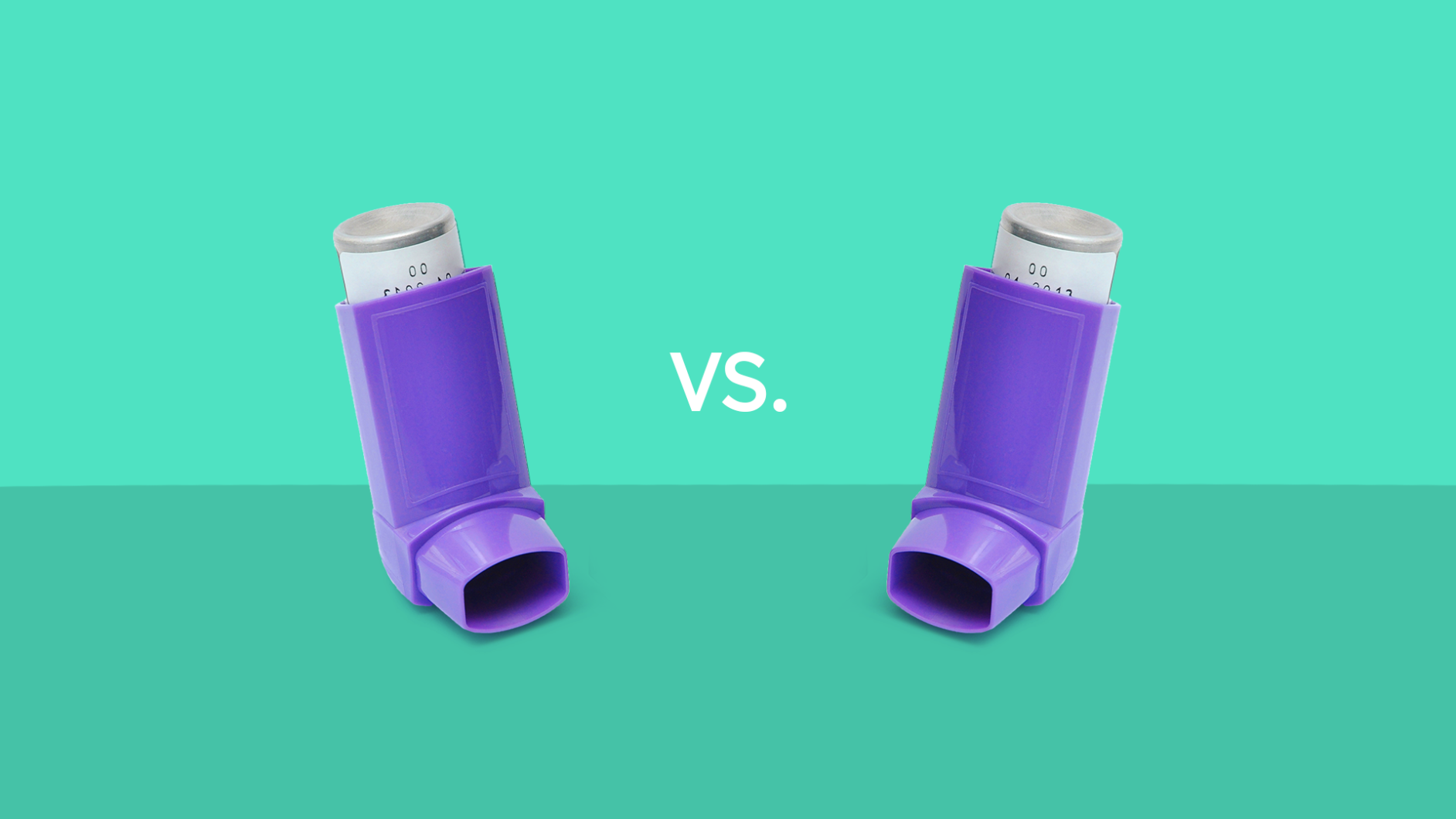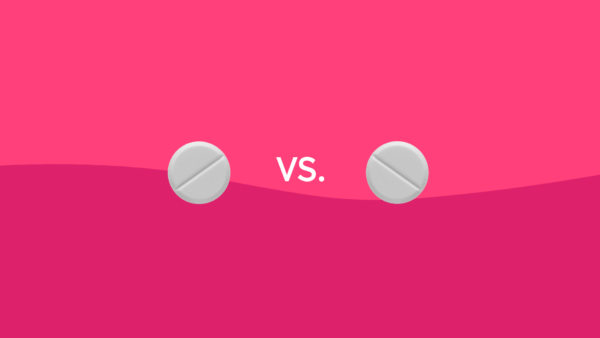Drug overview & main differences | Conditions treated | Efficacy | Insurance coverage and cost comparison | Side effects | Drug interactions | Warnings | FAQ
According to the American Lung Association, chronic obstructive pulmonary disease, or COPD, is the third leading cause of death by disease in the U.S. Over 16 million people have been diagnosed with COPD, with millions more likely affected but not yet aware. COPD is a chronic inflammatory lung disease. Patients with COPD often experience difficulty breathing, coughing, wheezing, and mucus production. COPD includes emphysema and chronic bronchitis. Two common medications used to manage COPD are orally inhaled medications called Incruse Ellipta and Spiriva.
Incruse Ellipta and Spiriva are both brand-name medications indicated for the long-term maintenance treatment of COPD. Both drugs are approved by the U.S. Food and Drug Administration (FDA). They are classified in a group of medications called anticholinergics. They work by relaxing the muscles in the lungs, making breathing easier.
Although Incruse Ellipta and Spiriva are both anticholinergics used for COPD, they are not exactly the same. Continue reading below to learn more about each medication.
What are the main differences between Incruse Ellipta and Spiriva?
Incruse Ellipta and Spiriva are both anticholinergic medications, available in brand name only. They are also known as long-acting muscarinic antagonists (LAMA).
The chemical name of Incruse Ellipta is umeclidinium. It is available in inhaler form only. GlaxoSmithKline (GSK) makes Incruse Ellipta.
The chemical name of Spiriva is tiotropium bromide. It is available as both an oral capsule (for oral inhalation, not to be swallowed—also called a dry powder inhaler) and an oral inhalation mist. Boehringer Ingelheim Pharmaceuticals makes Spiriva.
| Main differences between Incruse Ellipta and Spiriva | ||
|---|---|---|
| Incruse Ellipta | Spiriva | |
| Drug class | Anticholinergic | Anticholinergic |
| Brand/generic status | Brand | Brand |
| What is the generic name? | Umeclidinium | Tiotropium bromide |
| What form(s) does the drug come in? | Incruse Ellipta Inhaler (inhalation powder) | Spiriva Handihaler (capsules for inhalation), Spiriva Respimat (inhalation mist) |
| What is the standard dosage? | One oral inhalation (62.5 mcg) once daily at the same time every day | Spiriva Handihaler: Two oral inhalations of the powder contents of one Spiriva capsule (18 mcg) once daily, with the Handihaler device (capsules are for oral inhalation only; not to be swallowed)
Spiriva Respimat: 2 oral inhalations (of 1.25 mcg or 2.5 mcg) once daily |
| How long is the typical treatment? | Long-term | Long-term |
| Who typically uses the medication? | Adults | Handihaler: Adults Respimat: Adults and children six years and older |
Conditions treated by Incruse Ellipta and Spiriva
Incruse Ellipta and Spiriva are indicated for the maintenance treatment of chronic obstructive pulmonary disease (COPD). More specifically, the Spiriva Handihaler manufacturer information notes that it is used to reduce exacerbations in COPD patients.
Spiriva Respimat has one additional indication—maintenance treatment of asthma in patients ages 6 years and older.
Neither drug is to be used for an acute attack.
| Condition | Incruse Ellipta | Spiriva |
| Maintenance treatment of COPD | Yes | Yes (Handihaler and Respimat) |
| Maintenance treatment of asthma in patients six years and older | No | Yes (Respimat) |
Is Incruse Ellipta or Spiriva more effective?
There is minimal data comparing the two drugs directly. A 12-week study compared the efficacy and safety of Incruse Ellipta and Spiriva in just over 1,000 patients with COPD. The primary endpoint was trough forced expiratory volume in one second (also called FEV1) at day 85. Patients were evaluated using St George’s Respiratory Questionnaire and other assessments. Both drugs showed meaningful improvements in quality of life and were well-tolerated in terms of safety. The study concluded Incruse Ellipta to be more effective than Spiriva.
Only your healthcare provider can determine the most effective medication for you. He or she can consider the severity of your symptoms and your medical history, along with other medicines you take that could potentially interact with Incruse Ellipta or Spiriva.
Coverage and cost comparison of Incruse Ellipta vs. Spiriva
Insurance plans and Medicare Part D cover both Incruse Ellipta and Spiriva, but the coverage amount varies by plan.
The out-of-pocket price of an Incruse Ellipta inhaler is about $477, but you can use a SingleCare card to lower the price to about $306.
The out-of-pocket price of a Spiriva Handihaler is about $634, and a Spiriva Respimat is about $600. Using a SingleCare coupon will lower the price to approximately $404 for either the Handihaler or the Respimat.
| Incruse Ellipta | Spiriva | |
| Typically covered by insurance? | Yes | Yes |
| Typically covered by Medicare Part D? | Yes | Yes |
| Standard dosage | 1 inhaler | 1 Handihaler or 1 Respimat |
| Typical Medicare copay | $8-$395 | $3-$524 |
| SingleCare cost | $306+ | $404+ |
Common side effects of Incruse Ellipta vs. Spiriva
The most common side effects of Incruse Ellipta are nasopharyngitis (common cold), upper respiratory tract infection, and cough.
Spiriva’s most common side effects are upper respiratory infection, sinusitis, chest pain, dry mouth, constipation, and urinary tract infection.
This is not a complete list of side effects. Other adverse effects may occur. Contact your healthcare provider for a full list of side effects of Incruse Ellipta and Spiriva.
| Incruse Ellipta | Spiriva | |||
| Side effect | Applicable? | Frequency | Applicable? | Frequency |
| Nasopharyngitis/pharyngitis | Yes | 8% | Yes | 9% |
| Upper respiratory tract infection | Yes | 5% | Yes | 41% |
| Cough | Yes | 3% | Yes | >3% |
| Chest pain | No | – | Yes | 7% |
| Dry mouth | No | – | Yes | 16% |
| Constipation | No | – | Yes | 4% |
| Vomiting | No | – | Yes | 4% |
| Sinusitis | Yes | Not reported | Yes | 11% |
| Rash | Yes | Not reported | Yes | 4% |
| Arthralgia (joint pain) | Yes | 2% | Yes | 4.2% |
| Urinary tract infection | Yes | Not reported | Yes | 7% |
Source: DailyMed (Incruse Ellipta), DailyMed (Spiriva)
Drug interactions of Incruse Ellipta vs. Spiriva
Because Incruse Ellipta and Spiriva are anticholinergic medications, they should not be used with other anticholinergic medications. The combination could cause an increase in side effects, like urinary retention or narrow-angle glaucoma.
Other drug interactions may occur. Consult your healthcare provider for a full list of drug interactions.
| Drug | Drug class | Incruse Ellipta | Spiriva |
| Belladonna alkaloids Benztropine Clidinium Darifenacin Dicyclomine Diphenhydramine Hyoscyamine Ipratropium Orphenadrine Oxybutynin Scopolamine Solifenacin Tolterodine Trihexyphenidyl |
Anticholinergics | Yes | Yes |
Warnings of Incruse Ellipta and Spiriva
- Do not use Incruse Ellipta or Spiriva if you have a severe hypersensitivity to milk proteins or any of the ingredients.
- Incruse Ellipta or Spiriva are not intended for use in rapidly deteriorating or potentially life-threatening COPD acute episodes. These drugs have not been studied in acute episodes and should not be used to relieve acute symptoms. Do not take extra doses for relief of acute symptoms. Your healthcare provider should give you instructions on managing an acute episode—you will likely use a different, short-acting inhaler as a rescue inhaler.
- Incruse Ellipta or Spiriva may cause a potentially life-threatening paradoxical bronchospasm (worsening of breathing or wheezing), which should immediately be treated with a short-acting bronchodilator inhaler. If this occurs, discontinue Incruse Ellipta or Spiriva immediately. Your healthcare provider may prescribe an alternative treatment.
- Incruse Ellipta or Spiriva may cause hypersensitivity reactions, including anaphylaxis, angioedema, itching, or rash. Discontinue Incruse Ellipta or Spiriva and contact your healthcare provider if any of these reactions occur. If you have trouble breathing or experience swelling around your lips, tongue, and mouth, seek emergency medical treatment.
- Use Incruse Ellipta or Spiriva with caution in patients with narrow-angle glaucoma. Patients and their prescribers should look for symptoms of acute narrow-angle glaucoma (eye pain, blurry vision, visual halos). Consult your healthcare provider immediately if any of these symptoms occur.
- Use Incruse Ellipta or Spiriva with caution in patients with urinary retention. Patients and prescribers should be aware of urinary retention symptoms, such as painful urination and difficulty urinating. Consult your healthcare provider immediately if you experience these symptoms.
Spiriva only:
- Monitor patients with moderate to severe renal impairment for anticholinergic effects.
- Capsules are for oral inhalation only and should not be swallowed. Use capsules only with the Handihaler device.
Frequently asked questions about Incruse Ellipta vs. Spiriva
What is Incruse Ellipta?
Incruse Ellipta is an anticholinergic medication used for COPD. It helps to relax the lungs, making breathing easier.
What is Spiriva?
Spiriva is also an anticholinergic medication used for COPD. It is available as an inhaled capsule and also as an inhalation mist.
Are Incruse Ellipta and Spiriva the same?
Both medications are similar and in the same category of drugs. However, they do have some differences, such as side effects and dosage, outlined above.
Is Incruse Ellipta or Spiriva better?
Limited data is available comparing Incruse Ellipta to Spiriva. One study showed Incruse Ellipta to be more effective, but both medications to be equally safe. Your healthcare provider can determine which drug is better for you.
Can I use Incruse Ellipta or Spiriva while pregnant?
There is not enough information on the effects of Incruse Ellipta or Spiriva in pregnancy. Consult your OB-GYN for medical advice. If you are already taking Incruse Ellipta or Spiriva and find out that you are pregnant, consult your OB-GYN.
Can I use Incruse Ellipta or Spiriva with alcohol?
Although Incruse Ellipta or Spiriva does not interact with alcohol, drinking alcohol over a long time can increase COPD symptoms and weaken your immune system, worsening your COPD symptoms. Consult your healthcare provider for more information about alcohol and COPD.
Is Incruse Ellipta a steroid?
No. Incruse Ellipta is not a steroid. It is classified as an anticholinergic medication. It relaxes the muscles in the airways to make breathing easier.
Some inhalers do contain an inhaled corticosteroid and are used to treat COPD. Advair contains fluticasone (a steroid) and salmeterol (a long-acting beta-agonist). Another example is Breo Ellipta, which contains fluticasone furoate (a steroid) and vilanterol (a long-acting beta-agonist).
What inhaler is equivalent to Spiriva?
Other inhalers in the same category of Spiriva and Incruse Ellipta include Tudorza Pressair (aclidinium) and Seebri Neohaler (glycopyrrolate).
What’s the best inhaler for COPD?
That’s a tough question. It depends on a few factors, such as severity and type of symptoms, your medical history, and other medicines you take. Your healthcare provider can determine which inhaler is best for you.
There are dozens of inhaled medications on the market. Here are a few commonly prescribed inhaled treatments for COPD:
SABA (short-acting bronchodilators, or short-acting beta-agonists): Albuterol HFA, Proair HFA, Proventil HFA, Ventolin HFA, Xopenex
LABAs (long-acting beta2 agonists): Brovana (arformoterol), Serevent (salmeterol)
LAMAs (long-acting muscarinic antagonists): Incruse Ellipta (umeclidinium), Seebri (glycopyrrolate), Spiriva (tiotropium) Respimat or Handihaler, Tudorza Pressair (aclidinium)
LAMA + LABA combination inhaler: Anoro Ellipta (umeclidinium/vilanterol), Bevespi Aerosphere (glycopyrrolate/formoterol), Stiolto Respimat (olodaterol/tiotropium),
Utibron Neohaler (indacaterol/glycopyrrolate)
Inhaled corticosteroids: Qvar RediHaler (beclomethasone), Pulmicort Flexhaler (budesonide)
Combination corticosteroid + LABA: Symbicort (budesonide/formoterol), Advair (fluticasone/salmeterol), Breo (fluticasone/vilanterol), Dulera (mometasone/formoterol)





